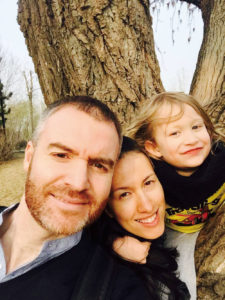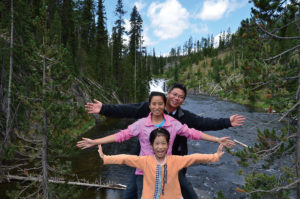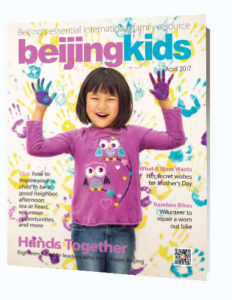 Tanya McHendry, originally from Germany, met her British husband Simon when they were both working in the hospitality industry. Simon still works in hotel management, while Tanya currently stays at home looking after 4-year-old John Arne, and runs a preschool music class. The family has lived in Beijing on and off since 2008.
Tanya McHendry, originally from Germany, met her British husband Simon when they were both working in the hospitality industry. Simon still works in hotel management, while Tanya currently stays at home looking after 4-year-old John Arne, and runs a preschool music class. The family has lived in Beijing on and off since 2008.
How does your child get on with your neighbors?
They get on really well. There are lots of kids around the same age, so it’s an open-door policy, they just knock on each other’s doors and play. They’re very mixed, there’s some from Hong Kong, some from China, Western and Asian kids, they all play with each other.
Do you celebrate festivals and holidays with neighbors?
We celebrate festivals at the Riviera Clubhouse. They always have activities for Easter, Christmas fairs, trick or treating at Halloween… There’s always something going on, they’re very active in bringing the community together. During Chinese New Year most people are away, so it’s really quiet.
How do you involve your child with community events and activities?
I’ve always liked bargain hunting, so over here, Roundabout is something I really support; it’s also giving back to the community. When we moved here and needed furniture, I wanted my money to go to Roundabout, so I bought it all there. John Arne is aware of what I do, we’ve been going there so much.
Have you involved your child in fundraising activities?
Just before Chinese New Year we helped fundraise for kids with leukemia. We sold apples and biscuits. We went around to cafes, approached tables and just sold cookies and apples. I was so nervous! He was totally cool with it. He said let’s go to the toy shop, and we ended up selling loads in the toy shop, there were so many parents with kids there, ready to spend. He was more relaxed than I was!
Have you involved your child in charitable work in the community?
Until he goes to school I’m going to keep the routine that in the afternoons we’ll do an hour a week working as volunteers at Roundabout. Then he’s with me teaching a preschool music class at the Country Club. Roundabout lets kids volunteer from the age of four, and he just turned four in November. The toys that are donated need sorting out, puzzles need to be done before they’re put out on the shop shelves, the building blocks organized and sorted. That’s the sort of thing kids can get involved in.
How do you make sure your child is actively involved with their school community?
He’ll only be doing half days at school until he’s six. In Hong Kong at 18 months he’d already started going to preschool, and by 2 all his friends were already in school. At that time I said “I don’t want to send my son to school at 2!” People are sending their kids to school way too early. One of the guys who was teaching in preschool started a forest group, so we went to that instead. Here, it’s the same challenges again. There aren’t that many activities for kids to do; there are four playgrounds here but during the day they’re totally empty, so parents think that for their kids to socialize they have to go to school. That’s why I’m running the music class, so half-day kids have something to do in the afternoons.
Do you talk to your child about social or civic responsibility?
He’s totally aware that when we go to Roundabout, every penny goes to the needy. And if you buy something, when we get home you need to give something else, so they can raise more money.
How do you talk about big issues like poverty, community and privilege with your child?
He’s aware that he’s blessed. We deal with it when he has a question. We’re always together which is one of the reasons he knows a lot; we do everything together, experience everything together. For example, in Hong Kong, when he was just two, we would take the bus on the way to preschool, and we’d see an old lady, hunched over, collecting boxes to take for recycling. I said to him, do you see that old lady? She’s so old but she’s working so hard, because she needs to find a way to pay for food. Every week I would give him money, something little to give to her, and she would wish for him to grow tall.
What do you do when you pass by beggars with your child? How do you talk about it?
We always want to give, but we’ve been told here, that it’s better to give to places like Roundabout, to bigger companies who we know will definitely give the money to people who need it. We’ve explained to John Arne that as much as we might want to give to them, there are some beggars that are not legit. But of course, we feel for these people.
 Yeats Zhong has been married to husband Allred for 13 years, and has known him for 21 years. He works for General Electric Company, and she is a research designer who enjoys reading, traveling, hiking and gardening. Their 10-year-old daughter Mickey is studying at The Elementary School Affiliated to Beihang University.
Yeats Zhong has been married to husband Allred for 13 years, and has known him for 21 years. He works for General Electric Company, and she is a research designer who enjoys reading, traveling, hiking and gardening. Their 10-year-old daughter Mickey is studying at The Elementary School Affiliated to Beihang University.
How does your child get on with your neighbors?
Very well. My daughter is an outgoing girl who’s always very friendly to our neighbors and greets the gate guards, cleaners, and other people in the community. She has a very strong ability to make friends with people of all ages; we are aware that we can learn from her.
Do you celebrate festivals and holidays with neighbors?
We spend a lot of time going for outings or having vacations with our neighbors if both families have spare time. Even when we only have a half-day weekend, we go to the movies, or go riding; sometimes we pick fruit in the countryside or fly kites in the park, other times we do cooking, DIY, or read. If it happens to be a little one’s birthday, we hold parties.
How do you involve your child with community events and activities?
There are activities such as handing out poems and fú characters (福, which means fortune) during Spring Festival, or handing out dog poop bags to neighbors at ordinary times. Sometimes she also takes part in voluntary work like picking up rubbish in the park.
Have you involved your child in fundraising activities?
Yes. Our school and community have organized activities such as donations to earthquake and flood victims, and to less developed regions as well. We have always participated in those activities, and sometimes my daughter asks me to send her own pocket money and favorite books to poor kids. Afterwards, she asks me why are there earthquakes and floods? And why are these people poor? Usually, we discuss questions and issues such as environmental protection, social systems and education.
Have you involved your child in charitable work in the community?
Yes, but there is far too little opportunity for us to take part in community action; maybe just once a year, irregularly. The community decided to collect children’s drawings for the elderly a few years ago. At that time, our daughter was very excited and submitted many works. Unfortunately, her wish of bringing joy to the elderly didn’t come true, because the activity was canceled at the last minute. Now, we sometimes do cleaning for the community ad hoc, without giving notice. However, we need to look at ourselves as parents, because we need to know more about our community and promote community development together.
How do you make sure your child is actively involved with their school community?
I always explain the meaning of school activities to my child, and always lead and give her encouragement to enjoy her participation and achievements. She is the most active child in her school community at present; although very busy, she is content with her lot. I communicate with my child every day during lunchtime, which not only promotes the parent-child relationship, but also is a good way to know about her school life. My daughter likes to share everything with us, from her own view on the school community to her likes and choices. We don’t intervene too much, but encourage her to persist with things that she loves to do. At evening parties, like New Year’s Party, she is the only students who appears both in the opening ceremony to play drum, and the closing ceremony to sing with the chorus. “I am the first, and currently the only, student who appears in both performances; but maybe there’ll be another student in future years, because I’m going to encourage others just like you encourage me,” she told me.
Do you talk to your child about social or civic responsibility?
Of course, we discuss topics such as smog, food contamination, water pollution, rubbish, order in public places, or Ofo bicycles very often. We talk about nearly everything we see and hear about, and in the end, it is still the topic of social responsibility and civil responsibility. Never underestimate your child’s awareness; maybe he or she has stronger awareness of responsibility than you.
How do you talk about big issues like poverty, community and privilege with your child?
If it is really a big issue, then I will encourage her to evaluate the issue objectively. Maybe she will ask big questions, such as why this country is wealthy and that one is poor? Why were American black people divided from white people when they went to school in the past? Why it is not that convenient to go to Taiwan and Hong Kong just like Shanghai? When she asks me these questions, I share the books I’ve read with her, and ask her opinion before I give my own. One time, she asked me the reason why China and the US don’t give out their money and food to African children. In order to answer this question, I showed her some poor areas in China and US, just to let her know that every society has its dual character. On another occasion during our trip to Japan, she told me that she didn’t like to visit there because all of her teachers and classmates didn’t like the country. Then I told her that finding the failings of Japan would be a good way to know its weaknesses: “Know your enemy and know yourself.” Actually, she learned a lot from that trip.
What do you do when you pass by beggars with your child? How do you talk about it?
If it’s a beggar who makes his or her living as a performer, I’ll encourage my child to take out her pocket money and help them; if it’s a beggar who lives by picking up rubbish, I’ll teach my child to respect them. However, if it is a completely healthy beggar who only sits on the ground, never give them any help.
No matter what sort of beggar we meet, my daughter will stop and ask me questions like why they beg people to give them money, whether they have families or not, why they don’t earn their own living, do they have a place to live, do they take a shower and so on. I always like her questions and discuss the various possibilities. Sometimes I encourage her to have a chat with the street artists. I just want to let my child know that the true happiness is creating a life for oneself.
Photos courtesy of Tanya McHendry and Yeats Zhong

This is an updated version of the article that originally appeared on p. 44-45 of beijingkids April Issue. Download the digital copy here.


